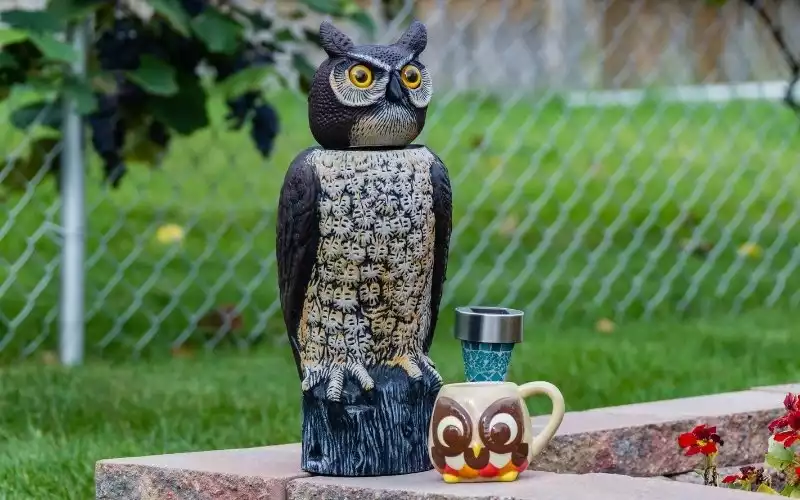Watching sunflowers grow in the garden can add so much happiness to your garden. The beautiful yellow flowers with happy, buzzing bees all over them. It’s magical.
Until you watch a squirrel run up the stalk of a sunflower and rip the entire head off and run away with it.
Yep, that was what happened to me last week.
I knew that squirrels were a culprit eating some of my sunflowers, but were they the only ones? I set out to learn what other animals eat sunflowers and how to help protect these majestic flowers from being eaten before they fully matured. That’s what you’ll find in this article.
What Animals Eat Sunflowers?
The most common animals that eat sunflowers include birds, squirrels, mice, deer, voles, and chipmunks. A lot of insects also enjoy eating the sunflower plant, like spittlebugs, beetles, and weevils.
Let’s talk through each one and what you can do to get rid of or prevent these pests from coming around in the first place.
1. Birds
Sparrows, finches, and cardinals are a few birds that absolutely love to eat the seeds of sunflowers. These birds often visit gardens and bird feeders to get their fix of sunflower seeds.
In addition, many types of hawks and other prey birds feed on the birds that do eat sunflowers, so you might see them hanging around your garden or feeder.
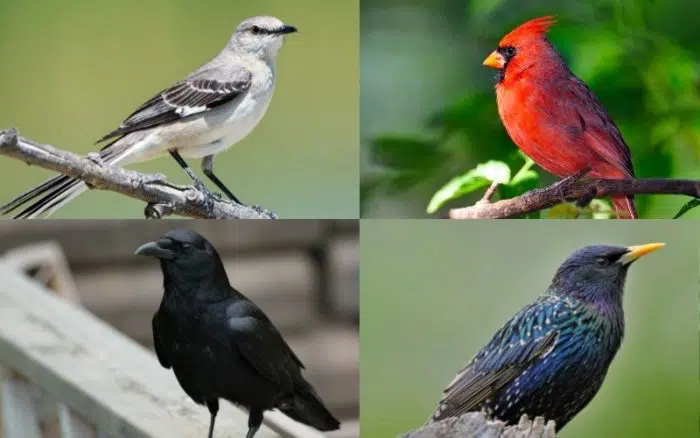
Most birds won’t bother your sunflower seeds until they are dried and ready to be picked.
What Birds Eat Sunflower Seeds?
Not every type of bird is going to eat sunflower seeds, but there are quite a few that will. If you’re growing black oil sunflowers, then you might expect more birds to hang around your garden as many types prefer this variety.
- Chickadees – chickadees do eat sunflower seeds as well, whether they are in bird feeders or just on the plant.
- Nuthatches
- Grosbeaks
- Cardinals
- American Goldfinches – these have been raiding my sunflowers this year, but they’re so pretty I almost don’t mind
- Mourning Doves
- House Finch
- Starlings
- House Sparrows
- Grackles
- Juncos
- Blue Jays
- Woodpeckers – while not as common, woodpeckers will each sunflower seeds on occasion
Sunflower seeds will attract birds to your garden, so make sure to keep an eye on them.
How to Keep Birds Away From Sunflowers
If you’re growing sunflowers to save seeds or eat the seeds yourself, you’re not going to love seeing birds ravaging your plants. There are a few ways you can keep birds off your plants.
Scarecrow or Fake Hawk
The other option is to set up a fake owl or scarecrow in the garden. Many birds will try to avoid anywhere a hawk is in plain sight as they don’t want to be attacked.
Fake owls are great for keeping many animals out of the garden, including squirrels, deer, birds, and more.
Birds are pretty smart though, so you will want to move it regularly so they don’t get used to it.
Bird Netting
One of the most effective ways to keep birds out of the garden is to use garden or bird netting. This might not be the most ideal method since sunflowers are so nice to look at, you probably don’t want to cover them at all. But that might be a tradeoff you want to take.
You can also choose a part of your sunflower patch to protect and let nature take it’s course on the others.
2. Squirrels
Squirrels are also big fans of sunflower seeds. This is probably quite obvious if you’ve ever watched a squirrel desperately trying to climb a bird feeder. Since sunflower seeds are common in bird feed, this means that you’ll have birds AND squirrels hanging around.
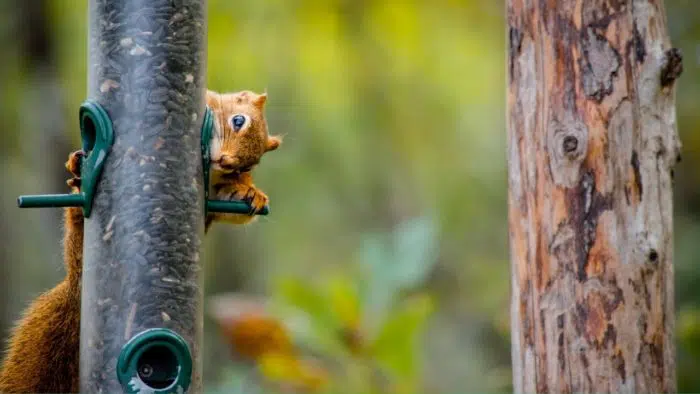
We have tons of trees in our yard, and I use to love watching the tree squirrels run around and go into their homes in the tree branches. But then the squirrels started eating my tomatoes, and I no longer loved seeing them around.
These rodents often bury nuts and seeds in the ground to save for later, and they will often dig up buried sunflower seeds to eat.
How to Keep Squirrels Away From Sunflowers
Protecting your sunflowers from squirrels can be a bit of a challenge since they’re very nimble, but there are a few good ways to do it.
Netting
Similar to the method above, this can help keep squirrels from getting to the seeds of your sunflowers. Again, not ideal, but it’s a possibility.
You can also use some kind of aluminum screening bent over the flower of the plants to save them from birds eating sunflower blooms.
Motion Activated Sprinkler
I got one of these to protect my garden this year. It’s been working out pretty well, although I’ve found it’s not as ideal for birds since they come from above.
You might be able to get the motion sensor setup in just the right way for birds, but I find it works better with animals on the ground.
3. Chipmunks
Chipmunks are another animal that loves sunflower seeds, so don’t be surprised to see them running around your garden.
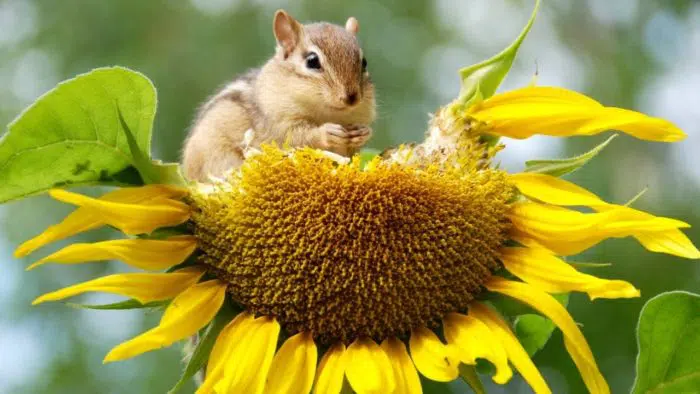
Unlike squirrels, chipmunks don’t hibernate during the winter so they gather more than they need during the summer and fall and put them in burrows for storage.
How to Keep Chipmunks Off Sunflowers
Unfortunately, keeping chipmunks off of your sunflowers is as challenging as keeping squirrels off of them. Chipmunks love sunflower seeds, and they provide a lot of healthy fats for them.
Bird netting can do as well of a job for chipmunks as it does for squirrels.
It lays on top of your plants and makes it much more difficult for rodents and other pests to reach the seeds or parts of the plant they’re trying to eat.
4. Garden Mice, Voles & Rats
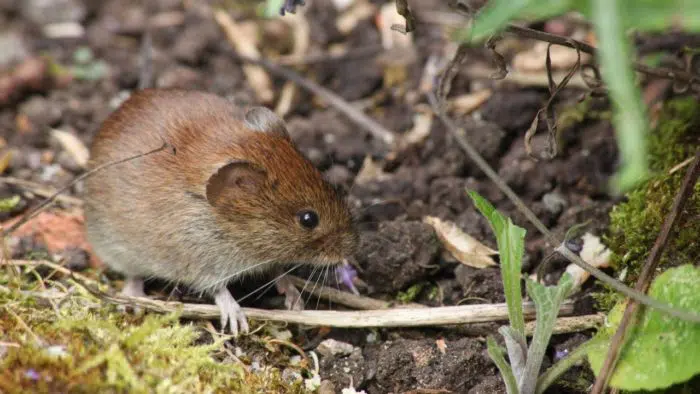
Garden mice and voles are also culprits of eating sunflower seeds out of the garden. While these pests can climb the plants, they also will dig the newly planted garden seeds out of the ground as well.
If you’re not seeing sunflower seedlings sprout up out of the ground a few weeks after planting, you might have been robbed of the seeds. These rodents will eat corn and sunflower seeds, so that’s something to keep in mind as well.
How to Keep Mice From Eating Your Sunflowers
Simple answer: get a cat. 🙂 While that’s a great option, it’s not always doable.
Mice can be kept away with small barriers like a solid fence or
Companion planting is another great way to keep unwanted pests away. This is when you grow plants nearby that help the plant they’re near and vice versa. Since mice don’t love the smell of garlic or onions, you can plant your sunflowers near them. Sage is another great option with a pungent smell that deters pests.
The scarecrow method can work with mice, voles, and rats as well, as they will want to avoid places that have predators lurking.
5. Raccoons
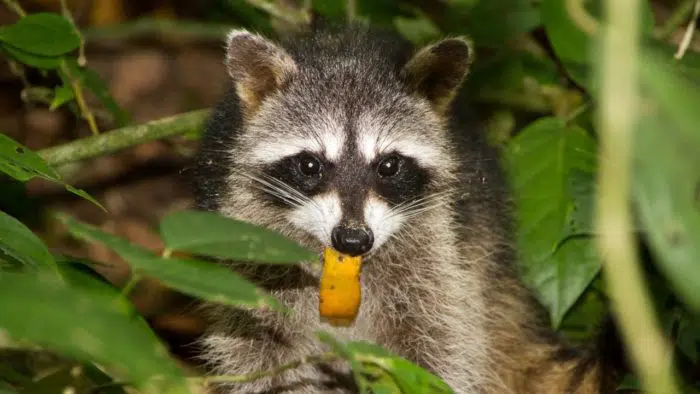
While raccoons won’t be the first to show up to eat your sunflowers, this is a definitely possibility. If they get hungry enough, they will eat seeds, nuts and other plants in your garden.
How to Keep Raccoons From Eating Your Sunflowers
There are a few methods for keeping raccoons out of the garden. Wind chimes, laser red eyes (that simulate a predator at night), and motion-activated sprinklers work great.
Motion-Activated Sprinkler
Raccoons get scared by loud noises and sudden movements, making this option a great one. Motion-activated sprinklers are one of my favorite ways to keep all kinds of animals out of my garden.
6. Deer
Yes, deer do eat sunflowers. Sunflowers are a good source of food for deer because they are high in nutrients like protein and fat. Deer will also eat the leaves of the sunflower plant.
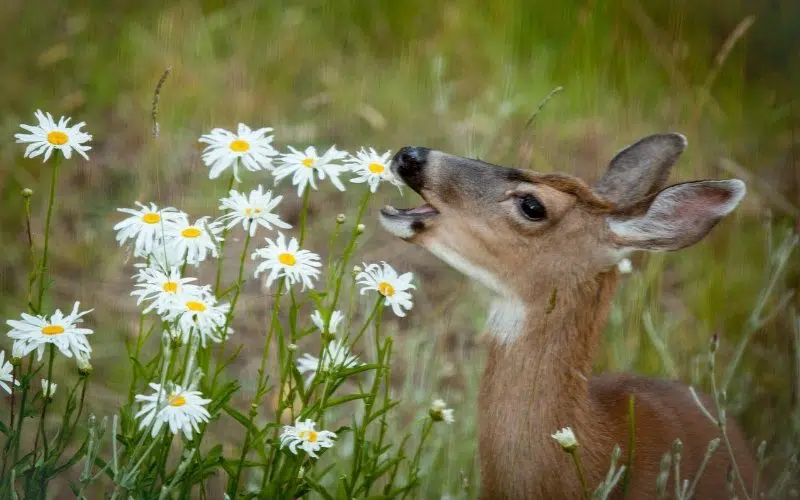
Deer will eat many types of flowers, and sunflowers is a big one for them.
How to Keep Deer from Eating Sunflowers
There are a few things you can do to keep deer from eating your sunflowers. The sprinkler I mentioned above works great for keeping these pests out of the garden as well.
Fencing
Planting sunflowers in a garden that is enclosed by a fence at least 8 feet tall is really the only foolproof way to keep them from eating your sunflowers seeds.
A 4-foot fence is like a fun obstacle they can jump over easily.
Scents and Smells
Another method for keeping deer out of the garden is Irish Spring soap. It sounds weird, but they will usually stay pretty far away from that scent.
Other than that, you can spray a chili pepper spray on the sunflowers to help protect them. Once they get a small taste of the pepper, they’re likely going to move on to another food source.
7. Rabbits
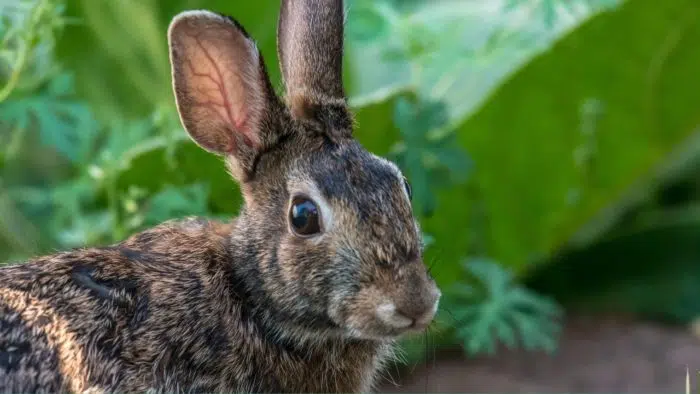
Rabbits eat garden plants like tomatoes and carrots, but they have also been known to eat sunflowers, the flowers, stalks and seeds. Of course, they won’t be able to reach the seeds, but they would eat the seeds a bird dropped seeds or the plant falls over. How to Keep Rabbits From Eating Your Sunflowers
How to Keep Rabbits From Eating Your Sunflowers
Rabbits love to eat garden plants when they can’t find enough clover around their nests. One great way to protect your sunflowers are to plant their favorites elsewhere.
I have a ton of clover in my yard and this does help a lot. They are always over by the clover, and seem to leave my other plants alone (for the most part). It’s not foolproof, but it helps quite a bit.
Fencing is the most effective for keeping rabbits out in my opinion. A short 2-3 foot fence will do the trick.
If you’re unable to put up a fence, a motion-activated fence is going to be your next best bet.
8. Insects and Other Pests
Sunflowers are great for bringing bees and other beneficial insects around your garden, but they also attract some not-so-great insects as well.
Spittlebugs are the first one I was no-so-lucky to find on my sunflowers last season. They’re not very noticeable, but what they leave behind is.
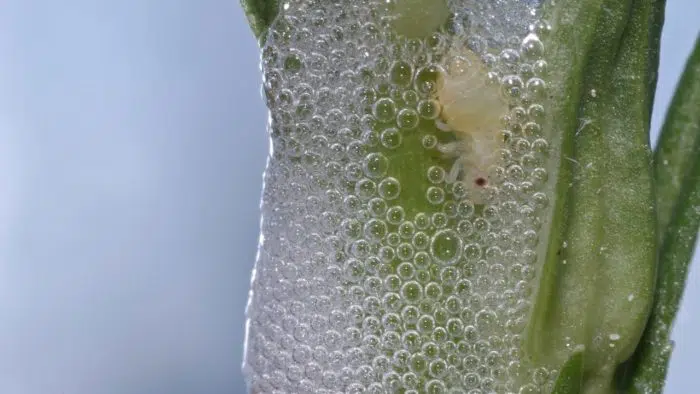
Spittlebug nymphs leave behind this weird foamy substance that honestly looks like human spit.
Some other sunflower bugs include:
- Seed weevils
- Aphids
- Cutworms
- Beetles
How to Repel Insects From Your Sunflowers
There are a variety of insects that love eating sunflowers, but how do you keep the ones that harm the plants away?
I have used neem oil this year to keep spittlebugs, aphids, and mites to a minimum. I’ve used this one on other plants in the past and it works great, but I never got around to spraying my sunflowers with it before the spittlebugs arrived.
Sunflowers Are Loved By Many Animals
Sunflowers produce seeds that are a valuable food source for many different types of wild animals, offering up the much-needed fats animals need to survive.
Not only will you help to feed the animals in your area (whether or not that is your goal!), but you also get to enjoy the beauty of these flowers.
You can plant sunflowers near other vegetables and plants that deter animals and pests, but at the end of the day you might need to use more reinforcements.


